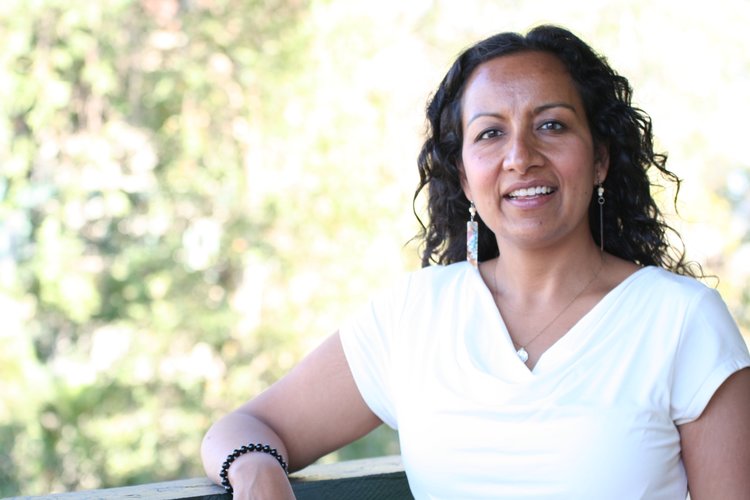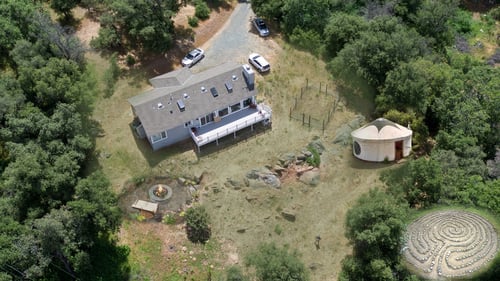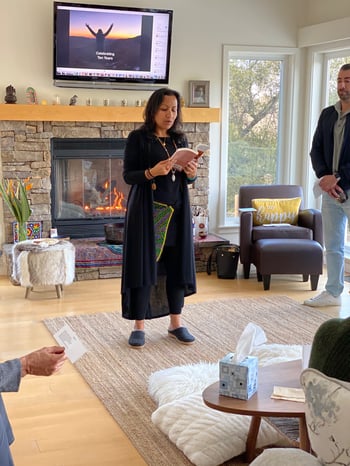The Heart and Soul of Peacebuilding
 Parminder Randhawa '10 (MA)
Parminder Randhawa '10 (MA)
The Kroc School connects regularly with its alumni, who are changemakers making bold social change locally and internationally. During a time in which the world is facing unprecedented challenges related to COVID-19, we sought out the perspective of MA in Peace and Justice alumna, Parminder Randawha '10 (MA), because of her role as a healer, teacher, and founder of Shamanic Soul Center and Ayni Anand Healing Sanctuary. Please enjoy the following excerpts from our conversation with Parminder.
What led you to become a healer?
While I was at the Kroc School of Peace Studies, I was focused on environmental justice, peace education, and conflict resolution, so I had all these things that I cared about. Sometimes, I felt overwhelmed by all the problems I was learning about and not sure how to really get to the root cause and bring lasting change. After a very powerful and transformative healing experience, I thought, “What we need…is healing.” There’s a saying that “Hurt people hurt people.” I think it’s true. Happy, healthy people just don’t go around causing wars and mayhem. After experiencing healing in my life, I felt so much more compassion and less fear. I could feel that I was becoming a better citizen of the world. Realizing this, I decided healing would be my contribution to creating a more peaceful, just world. There are so many ways of making the world a better place, and in order to co-create a world that has greater peace, justice and harmony, everybody can do different parts, and my part is in the healing arena.
After the Kroc School, I started training as a healer. In 2011, I began my Reiki training, and in 2012 I started my shamanic studies training. Now, I have been doing this work full-time for several years. I teach classes, facilitate retreats, and do a wide variety of other things in addition to the individual healing work I started with.
What big projects are you working on currently?

At the end of 2019, I was blessed to buy a property in Julian after several years of looking for a place to build a healing sanctuary. It’s a beautiful property on 4.5 acres, and we’ve launched phase one of creating the perfect place for nature immersion retreats. It’s called Ayni Anand Healing Sanctuary, and things are coming together incredibly well. My goal is to continue to do my healing work here, to create more educational opportunities for people to learn the beauty, magic, and power of this healing way, and to have programs that benefit the community. I plan to bring people out to Julian for healing experiences and to include teachings on sustainability and simple living – and how it's not just good for the planet, but also what's best for us because our modern ways aren’t working.
What courses from the Kroc School had the greatest impact on you?
Ami Carpenter's Conflict Resolution class immediately comes to mind. I really liked it because we looked at conflict resolution in the world, but also on a personal level. I also loved that Professor Carpenter taught us about appreciative inquiry. I thought that was a really beautiful approach. Instead of just looking at the problem, it looks at the strengths of an organization or a system and focuses on building on those strengths.
Also, the Environmental Justice class had a huge impact on me. I think about the paper I did on consumerism, and it just opened my eyes to things that I still think about today.
How has your Peace work changed amid COVID-19?
One of the things that I felt inspired to do immediately was offer a free healing circle for the community via Zoom, and it was amazing. It was well attended, and I received such incredible feedback from the participants on how helpful and powerful it was. What I would normally do with one person in a healing session, I did with 75 people. After that, I was inspired to commit to doing six monthly free healing circles. It’s been a powerful way to support people in navigating and healing the anxiety and fear that they have been experiencing due to the pandemic and the various crises we’ve been facing as individuals and as a nation. I’m now doing most of my work remotely. I do healing sessions by phone and teach classes by Zoom. It’s such a blessing to do work that can be done via distance, and it feels really fulfilling to support people during this challenging time. I’m getting to build the healing sanctuary amidst all of this and am incredibly grateful to be able to host small, outdoor private retreats for those seeking to go deeper with their healing and growth.
What piece of advice do you have for current Kroc School students?

You, as one individual, are not responsible for the fate of the world. There are seven billion plus people on the planet and – I like how the Dalai Lama put it – we each have a responsibility to contribute to the happiness and well-being of the world. But sometimes we can feel overwhelmed by the enormity of the need, and I think it’s helpful to remember we are not alone in this responsibility.
Learning about the world can really put a toll on our own emotional and mental health and well-being because we're often overwhelmed by the scale of these problems. Vicarious trauma is real, so when people experience trauma first-hand or are exposed to it in some way, it can take a toll. You have to take care of yourself: look at your personal well-being and home life and take good care of those. A Navajo healer once told me, “You have no business going out trying to heal the world until you’ve gotten your house in order.” I don’t feel we need to reach some mythic state of perfection in order to serve and be of benefit, but I do feel we can’t neglect our personal well-being and the well-being of our family.
Lastly, in terms of advice for students, I think it’s important to do your own work and practice what you’re advocating for. You cannot be a peacebuilder with a heart full of hatred, anger, or resentment. You have to do what’s needed to cultivate a sense of inner peace and be grounded in your purpose. Really try to get back to your heart and soul, and remember why you are here. Bring that heart and soul into everything you're doing because I think when we lose the heart and soul from peacebuilding, it just becomes like anything else and can do harm. But if we keep focused on our heart and soul, that has a way of grounding us and can serve as our North Star.
Learn what kind of peacebuilder you are!
Interested in learning more about the Kroc School's MA in Peace and Justice? Learn more here.

About the Author
The Joan B. Kroc School of Peace Studies (Kroc School) at the University of San Diego is the global hub for peacebuilding and social innovation. Founded in 2007, the Kroc School equips the next generation of innovative changemakers to shape more peaceful and just societies. We offer master's degrees in peace and justice, social innovation, humanitarian action, conflict management and resolution, and a dual degree in peace and law — programs that have attracted diverse and dynamic students from more than 50 countries. In addition to our graduate programs, the Kroc School is home to the Kroc Institute for Peace and Justice (Kroc IPJ). Founded in 2001, the Institute supports positive change beyond the classroom. Through groundbreaking research, experiential learning, and forward-thinking programs, the Kroc School and Kroc IPJ are shaping a future in which peaceful co-existence is the new normal.





